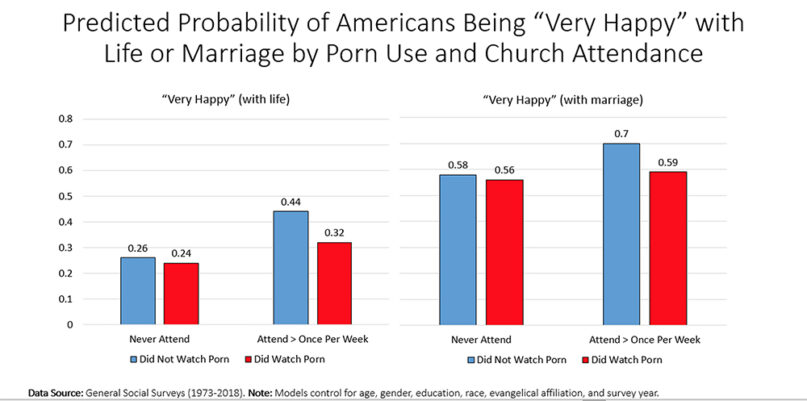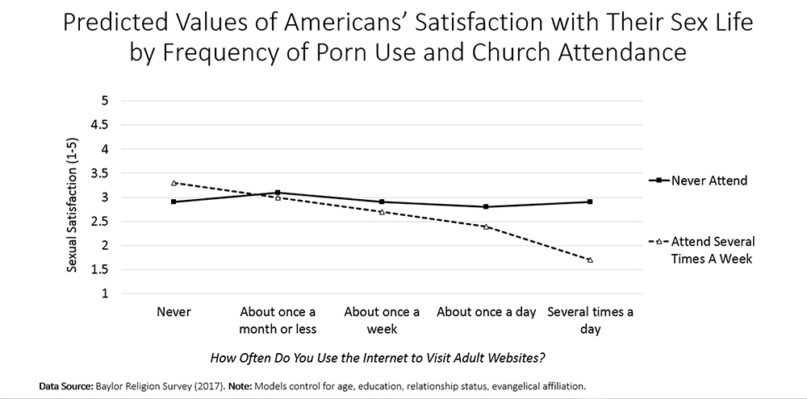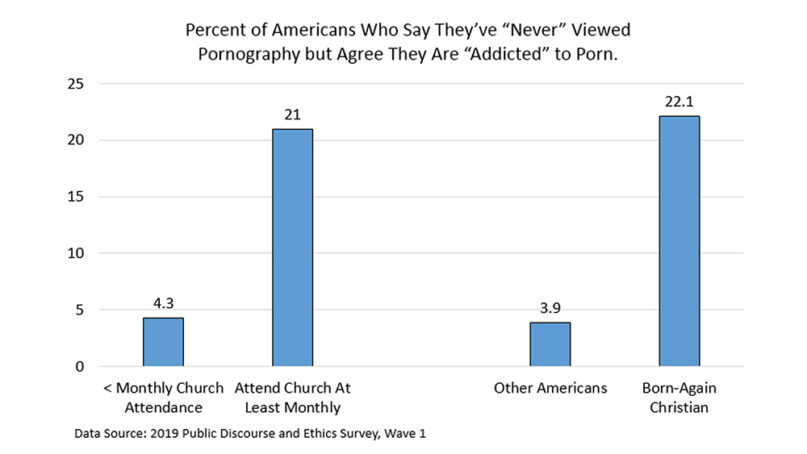(RNS) — When I first started studying the influence of pornography use on Americans’ lives six years ago, I found that people who watch porn more frequently tend to have poorer sense of personal well-being and more troubles in their relationships. But soon I noticed something that surprised me: The negative outcomes are strongest, and sometimes only, among those who are more religiously committed, and especially committed Christians.
In the below chart on personal and marital satisfaction, based on the massive opinion research operation known as the General Social Surveys, I compare the church attendance habits of Americans who did and did not use porn in the previous year.
Look at those who never attend. Whether or not they viewed pornography makes nearly no difference in their life or marital satisfaction. But look at the “happiness gap” for frequent churchgoers. Among those who attend more than once a week, there is a more substantial drop in both personal and relational happiness if they watch porn.

Predicted Probability of Americans Being “Very Happy” with Life or Marriage by Porn Use and Church Attendance. Graphic courtesy of Samuel L. Perry
Before I explain why, let’s look at a more specific indicator of personal and relational happiness, like sexual satisfaction, and a better measure of pornography use.
In the chart below I predict how satisfied Americans are with their sex lives using data from the 2017 Baylor Religion Survey. I focus on how frequently Americans watched internet porn and compare the sexual satisfaction of those who never attend religious services and those who attend most frequently.

Predicted Values of Americans’ Satisfaction with Their Sex Life by Frequency of Porn Use and Church Attendance. Graphic courtesy of Samuel L. Perry
Look again at those who never attend church. Whether they “never” view porn or view it “several times a day,” their sexual satisfaction doesn’t change. For frequent churchgoers who watch porn, it’s a different picture entirely: Though their sexual satisfaction starts off slightly higher, as their porn use increases, their sexual satisfaction declines in a linear fashion.
What’s going on here?
My frequent co-author, Bowling Green State University psychology professor Joshua Grubbs, and I have identified what we call “moral incongruence”: the experience of intentionally violating one’s deeply held moral values. Moral incongruence results in depressive symptoms and spiritual discouragement often due to shame and isolation. In other words, whatever the negative effects of porn alone, they are consistently far worse for those who seem to be violating their own moral values in watching it.
In subsequent studies (still under peer-review), we’ve found that these “moral incongruence effects” extend not just to pornography but homosexual behavior and non-marital sex as well.
When it comes to porn, studies show that, despite their beliefs, deeply religious Americans view porn only slightly less often than other Americans. They are choosing to experience psychological and relational turmoil, and not necessarily because of what pornography does to their brains, but because of what pornography means to their social group.
But beyond internal conflict, devout Americans who watch porn are also more likely than others to experience relational troubles because of their spouse’s rejection of pornography. Data from the Portraits of American Life Study show that if Americans have deeply religious spouses, the more frequently they view pornography the less satisfied they are in their marriage. Why? Because their spouses are more likely to view pornography as a betrayal, adultery, and an extreme moral failure.
Thus again, the consequences of pornography use for deeply religious Americans is more severe than for others.
The religious stigma against porn is apparently so strong that many committed Christians consider themselves addicted to pornography even when they rarely or never look at it. Let me say that again. They’ve never viewed porn but think they’re addicted to it.
The chart below shows the percentage of Americans who say they’ve never in their lives viewed pornography, but when asked about whether they were addicted to porn agreed that they were. Notice the stark difference between monthly churchgoers and born-again Christians versus other Americans.

Percent of Americans Who Say They’ve “Never” Viewed Pornography but Agree They Are “Addicted” to Porn. Graphic courtesy of Samuel L. Perry
This phenomenon may well be influencing public policy. Since 2016, at least 29 (mostly red) states have sought to pass resolutions declaring pornography a “public health crisis,” often citing pornography’s detrimental effects on marital relationships as well as on its ability to “addict” viewers.
Do my findings mean that, to paraphrase Hamlet, “pornography is neither good nor bad, but thinking makes it so”? I wouldn’t go that far. But if habitual porn use is bad, a certain kind of thinking undeniably makes it worse. Any assessment of pornography’s supposed “harms,” certainly, should recognize that these ill effects are often not universal but dependent on a community’s sanctions against it.
(Samuel L. Perry is an associate professor of sociology and religious studies at the University of Oklahoma and the author of “Addicted to Lust: Pornography in the Lives of Conservative Protestants” and a co-author of “Taking America Back for God: Christian Nationalism in the United States.” The views expressed in this commentary do not necessarily reflect those of Religion News Service.)
Ahead of the Trend is a collaborative effort between Religion News Service and the Association of Religion Data Archives made possible through the support of the John Templeton Foundation. See other the Ahead of the Trend articles here.





